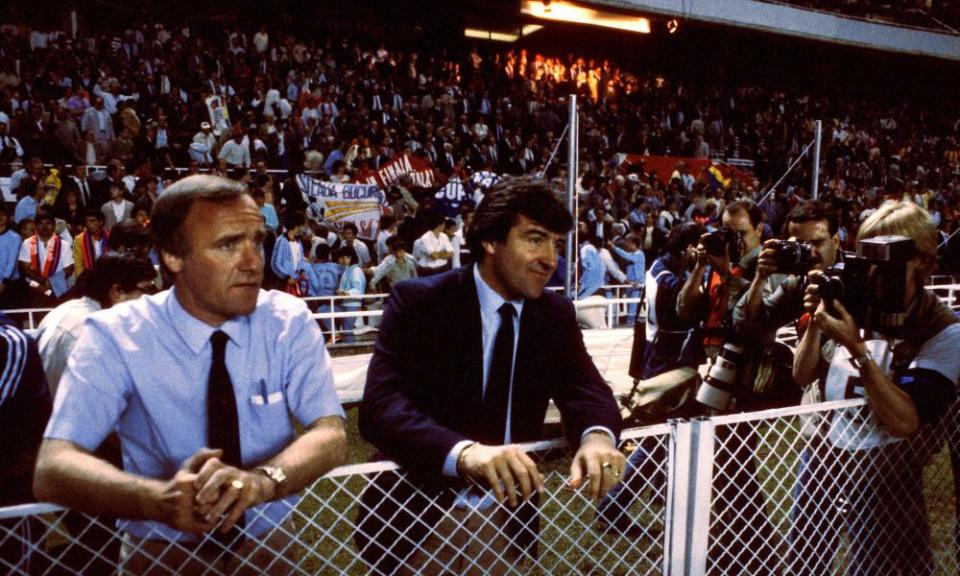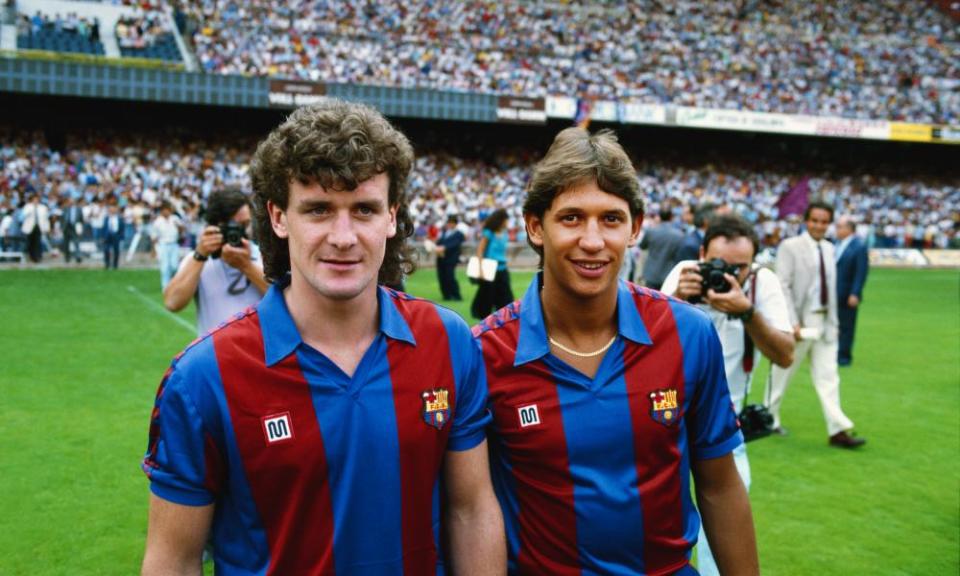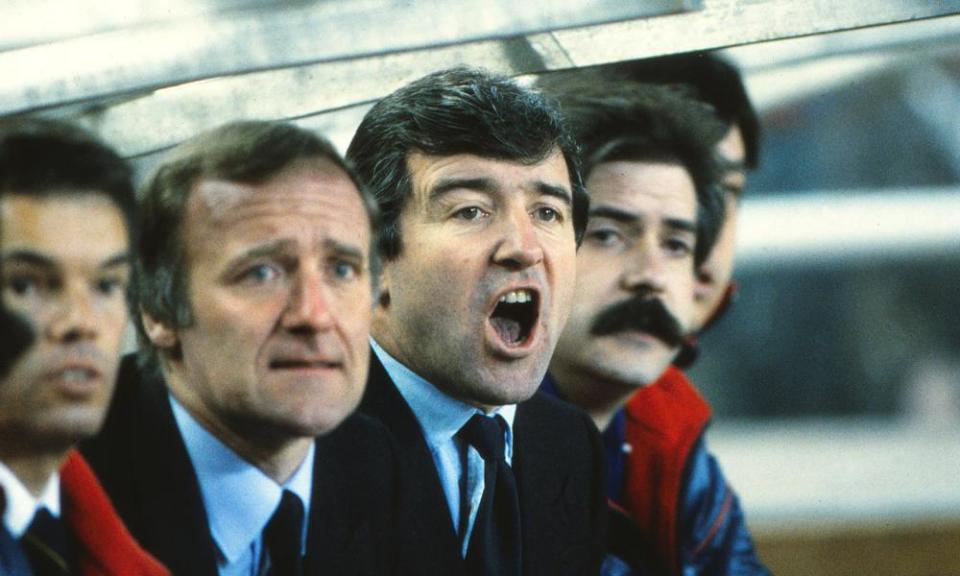‘Adios, Míster’: Venables led Barça to title glory before sharing final trauma

When Terry Venables told Jim Gregory he had an interview to become coach at Barcelona, the QPR chairman just laughed and wished him luck. The man they would come to call míster admitted later that he was “flattered they had even heard of me” – plenty had not. He spent his first day in the city walking the Ramblas alone and ended it climbing out of the window to escape the journalists hammering on his hotel room door, wanting to find out about the new guy. Starting with the basics, which they never did get quite right: “It’s pronounced Véneibols, with the accent on the first ‘e’,” Mundo Deportivo reported. He was, the forward Pichi Alonso says, “a complete unknown”.
Twelve months later, Venables had led Barcelona to the league title, the first they had won in 11 years, only their second in quarter of a century. A year on from that he had taken them to within a penalty shootout of a first European Cup, and subsequent eternity. He had never felt so depressed after a defeat. “That had a devastating effect on him,” recalled Gary Lineker, who joined soon after and would eat with Venables a couple of times a week, tactics on the table, glasses here, forks there. “I knew they had lost the final but didn’t register that I had joined a club in mourning and it was like: ‘Oh, this isn’t the best time.’”
Barcelona had been so close to it being the very best time in their history, their everything, celebrated for ever. Instead, while Venables continued for another year, finally walking four weeks into the 1987-88 season, something had broken.
Related: Terry Venables was a football romantic who made every player feel like a star
Take a step back and what Venables did in Catalonia was extraordinary. What he experienced was too, a life well lived. Sure, his Pyrenean mountain dog Bilko was too big and got him in trouble, but there was singing in Up & Down club and a transformation on the field. Today that is recognised, every paper in Catalonia leading with his passing, the fondness clear. “Adios, Míster,” the headlines say.
“That European Cup should have been historic, the first,” Steve Archibald has said. “It became a trauma and everything was torn up. But it was our team that brought Barcelona out of the darkness. I thought Terry was a genius at the time and I don’t think he has got enough credit for what he did. I thought it was wonderful.”
It hadn’t been the best time for Venables to arrive, either. Barcelona was a club in crisis with Diego Maradona banned for three months and about to depart, players and board at war. César Luis Menotti, the outgoing coach, had suggested to Venables that he take over early, which wasn’t so much an offer as an attempt to get out of there, a trap his successor avoided. Menotti was the eighth manager in five years. Bobby Robson had turned them down for a second time but recommended his countryman to Joan Gaspart, an English-speaking vice-president. Venables was a young coach, different, Robson said.
At the end of his interview for the job, Venables pulled a cigar from his sock and handed it to the other vice-president, Nicolau Casaus. That had him convinced, Venables would later claim. Others took a little longer, but not much. Aged 41, coming from QPR, Venables was acutely aware of the idea that here was some English bloke they had pulled off the beach. He won’t make it to Christmas, one columnist insisted. He finally went three years and three months later. No one had lasted that long since Ferdinand Daucik in 1950-54.
“English managers were rated but there was a doubt about them outside England; we thought they weren’t very good tactically,” Alonso admits. “And that was precisely what Terry showed he was good at: tactically, strategically, he was excellent. And the team worked extremely hard physically; in fact, maybe we paid for that in the second season. He was a good guy, too: happy, empathetic … he reached you. He was closer, more genuine than Menotti.” That summer, Alonso’s daughter was involved in a serious accident; he recalls the new manager turning up at the hospital with a huge cuddly toy under his arm.

The full-back Julio Alberto would later say Venables had done the complete opposite of what they had expected him to do. The system, adapted from what he had seen Liverpool do and put into place during pre-season in Andorra, quickly won them over. Archibald, who Venables insisted on bringing in to replace Maradona and chose ahead of Hugo Sánchez (no pressure, pal), believes the press was born there. “I don’t know if we had an impact on [Pep] Guardiola, but we did it first,” he says.
Perhaps the best response is a photo. You may have seen it over the past couple of days: Venables on the shoulders of the centre‑back Migueli, celebrating reaching the European Cup final. The ballboy who is looking up at him admiringly is Guardiola. Either side of Venables, the only league titles won by Barcelona in 40 years have Johan Cruyff’s fingerprints on them. Listen to Lineker talk about those long lunches and the admiration for a coach who saw the game like no one else is overwhelming.
“We played a 4-4-2 with a diamond,” Alonso recalls. “He would identify which full-back was weakest and isolate him, allowing him to receive and then we would be on him, cutting off all his escape routes. We used these diagonal runs from the point of the diamond to the wide areas, where moves began, that no one had. He introduced set pieces and corners where there would be a line of players, providing a screen for [José Ramón] Alexanko, who scored loads that season. No one did that then and coaches would fall for it by sticking their biggest man on him who would just get blocked off.”
It all began at the Bernabéu. There had been a pessimism around the place, and opening the season there didn’t please anyone – except Venables, who enthused at the opportunity. That proved contagious, at least after they won. Alonso recalls: “Things weren’t working, you replace Maradona with Archibald, who wasn’t that well known, and people thought: ‘Well, if last year it wasn’t to be, what chance is there this year?’” Barcelona won 3-0, with Archibald scoring.
Barcelona won the league with a penalty save from Javier Urrutikoetxea, prompting perhaps the most famous piece of radio commentary in the club’s history when Joaquim Puyal shouted: “Urruti, I love you!” But if that makes it sound close, it wasn’t: there were still four weeks to go and, at a time when it was still two points for a win, Barcelona won the title by 10 points over Atlético Madrid, 17 over Real Madrid. More than 100,000 people were on the streets to celebrate, the scenes wild. A year on, almost as many were in Seville for the European Cup final against Steaua Bucharest.
In the semi-final first leg, Barcelona were losing 3-0 in Gothenburg when Venables decided not to put Alonso, his only forward, on to the pitch, instead choosing a centre-back called Esteve Fradera. “I thought: if I don’t play today, I never will,” Alonso says. “It was a catastrophe, and I said so.”

“Three or four days later, he calls me in. He says: ‘I know you’re angry with me. But when you’re a manager, and I know you will be one day, you’ll realise that what the majority of people would do isn’t always the right thing to do. If we had lost 4-0 or 5-0, there would be no chance. Now, there still is.’ On the inside, I can’t believe what I’m hearing, I’m pissing myself. ‘Yeah, right. There’s a chance. Sure.’ But the thing is: he was right. It happened. Before the second leg he calls me in and says: ‘Don’t tell anyone, but you’re playing.’ I say: ‘I won’t even tell my wife.’” Barcelona won 3-0 and went through on penalties. Alonso scored a hat-trick.
It was done. They had struggled past Porto, Juventus and now Gothenburg, always on edge, but at last Barcelona were going to be European champions. This was their great obsession, all they ever wanted. The final was in Seville, practically at home, in front of tens of thousands of their fans against a team that had no chance.
Which might well have been part of the problem. There were problems everywhere. Barcelona’s players were tired, burnt out. There were injuries, and there was a breakdown within the club, between the presidency and the players, straining relationships that Venables had with some of them too. Taken off late in the game, Bernd Schuster walked straight out the stadium. In 120 minutes and four dreadful penalties, which no one wanted to take, the pressure unbearable, Barcelona didn’t score. Bucharest goalkeeper Helmuth Duckadam was the unexpected hero. The hurt never truly went away.
“Eleven years we had gone without winning the league: 11,” Alonso says. “But that final buried it, threw earth over it. We were the team, for ever. Instead we were the damned, cursed. You know, if we had lost the semi-final, we’d have been fine. But then that happened. We were so close. And if we win the European Cup they build Terry a statue.”

 Yahoo Sport
Yahoo Sport 






































